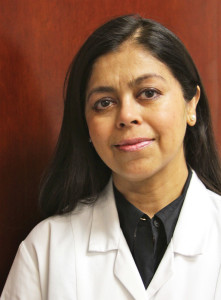
Dr. Afroze Ahmad
Dr. Afroze Ahmad shares the following question and answer sessions actually conducted with her patients.
I am a healthy and active diabetic with excellent blood sugar control. So, how can I keep my heart in good shape?
Keep a log of your hemoglobin A-1-C, and try to keep it under 7 percent, or better still, 6.5 percent. An emphasis should be on carbohydrate monitoring, with major carbohydrate intake derived from fruits, vegetables, whole grains and legumes. A weight loss of even 3 to 5 percent can have a favorable effect on your overall heart health. Keeping your blood pressure less than 140/90, or, in certain cases, less than 130/90, should be the goal. DL, also called the bad cholesterol, should be treated with if greater than 70mg/dl. Take baby aspirin daily if there is a 10 percent risk of developing heart disease at 10 years, in the absence of certain bleeding risks from aspirin. With regard to testing, the basic recommendation is to obtain an EKG, undergo an ultrasound to assess the blood supply to the legs, and consider a stress test, especially if there is a strong family history of heart disease.
My husband snores more than I do. Yet, doctor, you tell me I am at a higher risk of heart problems from snoring. It just does not make sense to me.
The jury has returned with a verdict here. Compared to men, women with significant sleep apnea have a higher risk of not only developing thick heart walls, but also heart failure. Addressing your sleep pattern and snoring issues with your doctor today will decrease your future risk of heart disease.
My father was healthy, with no heart problems. On his 80th birthday, he had a massive stroke and died six days later. I am healthy, and even had quadruplets 15 years ago, with no complications whatsoever. So, doctor, can you tell me, how will I manifest heart disease for the first time?
It may come to you as a surprise, but your father’s presentation is rather rare for someone in your age group. Generally, the most common presentation of heart disease is not a massive stroke or heart attack, but rather chest pain, a mini stroke, ankle edema, the inability to lay flat in bed at night, the use of more than one pillow to sleep at night, shortness of breath, or pain in the legs while walking. Men, on the other hand, before the age of 60 years, may present with an aortic aneurysm, heart attack or sudden death. Now, you can appreciate the importance of talking to your doctor about your symptoms, or, in the case of your husband, simply letting his doctor assess his heart disease risks.
Last month, I helped my son move his stuff into a dorm. Since then, muscles in my legs and arms are so sore. My son’s furniture and books were not all that heavy, but I think I am just too old for this kind of work. So, I am calling to let you know I will not be able to keep my appointment for later this week, and will reschedule as soon as I have the energy.
I prompted Tim to come to the clinic the same evening. Tim looked tired and complained of generalized aches and pains. We stopped his Lipitor medication that same evening and drew blood, which later confirmed the clinical diagnosis of Lipitor-related muscle pain. Now off the Lipitor for three weeks, Tim is doing great, with complete resolution of his aches and pains. He is scheduled to meet with me next month to discuss other options for his high cholesterol treatment.
The name and age of each patient having these conversations with Dr. Ahmad have not been disclosed or have been changed to ensure patient confidentiality.
Dr. Afroze Ahmad is a cardiologist who cares and listens. She is a multiple board certified cardiologist practicing at Las Sendas Cardiology, located at 3514 N. Power Road, Suite 107, at the southwest corner of Power and Thomas roads in Mesa.
For more information, or to make an appointment, please call (480) 361-9949.

